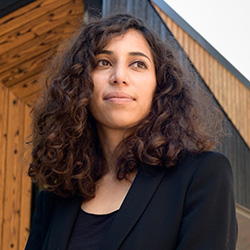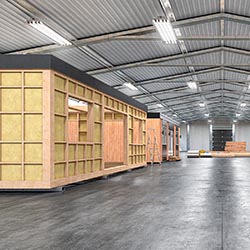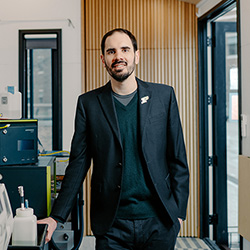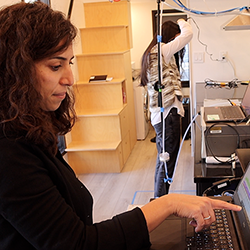Architectural Engineering
Architectural Engineering (ArchE) deals with integrated design, construction and operation of buildings. It includes all engineering aspects related to the built environment: building envelope, mechanical systems (HVAC), electrical systems, lighting systems, construction, indoor environmental quality and human comfort- and is therefore related to multi-disciplinary research and education.
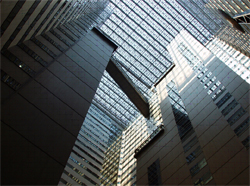
Buildings in the U.S. account for more than one third of the total energy use and associated Greenhouse Gas Emissions. With increasing concern about climate change and energy prices, Architectural Engineers have a critical task for the following decades. In Civil Engineering's Architectural Engineering area of emphasis, students have the opportunity to study the integration of different building systems and to learn how to design for sustainability and energy efficiency. The area of emphasis provides flexibility and offers several courses on energy and buildings, design of electrical/mechanical systems, lighting systems, as well as on building envelope, building controls, renewable energy sources, indoor air quality and energy modeling. A minor in Architectural Engineering is also available to all students in the College of Engineering except students in the School of Civil Engineering.
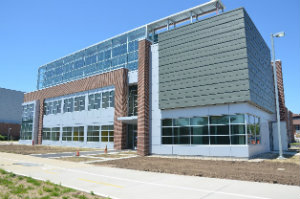
The faculty members of Architectural Engineering are dedicated to research and teaching, with focus on Building Science and design/operation of energy-efficient buildings. Specific topics of research include: thermal and visual comfort, indoor air quality and ventilation, innovative building envelopes, daylighting and electric lighting design & control, energy-efficient equipment, HVAC system design and control, smart buildings, passive/active solar energy technologies, building energy modeling and simulation, and sustainable/green building design.
Architectural Engineering faculty are associated with the Ray W. Herrick Labs. Together with the HVAC Group in ME, we have one of the largest teams in the US conducting research related to the built environment.
The Architectural Engineering group has unique, state-of-the-art facilities to study building performance in terms of energy and indoor environmental quality. These include several room-scale facilities at the Architectural Engineering Laboratories, located at the Bowen Lab, as well as whole building-scale facilities at the Center for High Performance Buildings, located in Herrick Labs.
Spotlights
October 20, 2025
Daylight and window views positively affect health and well-being in many ways. However, children with Autism Spectrum Disorder (ASD) are hypersensitive to environmental stimulation, which leads many educational facilities to use windowless spaces or fully block natural light to avoid potential distractions. Professor Thanos Tzempelikos leads a $600K collaborative research project with Ball State University, sponsored by NSF, to solve this problem.
August 20, 2025
A typical morning hair care routine can expose you to as much immediate nanoparticle pollution as standing in dense highway traffic, report Purdue University engineers.
May 22, 2025
Jordan Cross, a Ph.D. student in the Lyles School of Civil and Construction Engineering, has been awarded the 2024 Stephen H. Rothblatt Memorial Scholarship by the Air & Waste Management Association – Lake Michigan States Section (AWMA-LMSS). The award was presented at the Annual Air Conference in Chicago.
February 20, 2025
What's in the air we breathe indoors? That's what Brandon Boor, the Dr. Margery E. Hoffman Associate Professor in Civil Engineering, and Nusrat Jung, assistant professor of civil engineering, are researching in our buildings - at home, school, work and beyond. In the latest episode of 'This Is Purdue,' Boor and Jung share their journey from Finland to Purdue's Lyles School of Civil and Construction Engineering and the early experiences that shaped their passion for research.
February 17, 2025
Bringing aromas indoors with the help of chemical products — yes, air fresheners, wax melts, floor cleaners, deodorants and others — rapidly fills the air with nanoscale particles that are small enough to get deep into your lungs, Purdue engineers have found over a series of studies.
December 12, 2024
A research team led by Nusrat Jung, an assistant professor in the Lyles School of Civil and Construction Engineering, has developed a new rapid screening method to test for volatile chemicals.
September 27, 2024
Dr. Brandon E. Boor has been named the Dr. Margery E. Hoffman Associate Professor in Civil Engineering. This professorship has a 5-year term that will extend through Fall 2029.
September 10, 2024
Civil Engineering and Herrick Labs PhD student Sichen Lu is a recipient of the prestigious ASHRAE Grant-in-Aid Award for 2024-2025. This $10,000 award is given to outstanding graduate students performing research in the High Performance Buildings or HVAC&R fields.
September 10, 2024
Civil Engineering and Herrick Labs PhD student Sichen Lu has received the Fontaine Memorial Fellowship for the 2024-2025 academic year.
September 10, 2024
Civil Engineering and Herrick Labs PhD student Sichen Lu won the Best Paper Award at the 8th International High Performance Buildings Conference, organized at Purdue in July 2024.
August 22, 2024
Dr. Nusrat Jung, Assistant Professor in the Lyles School of Civil and Construction Engineering has been appointed to the Early Career Editorial Board of Indoor Environments, published by Elsevier.
June 10, 2024
A Purdue research team led by Panagiota Karava, Professor of Civil Engineering, has been awarded a $1.6M grant from the National Science Foundation to fund their project "Smart energy assistants for affordable housing communities."
June 7, 2024
The U.S. housing market is in crisis, due to a lack of affordable housing and a shortage of labor and materials to build them. Purdue University has a solution: NextHouse, an initiative to develop the next generation of factory-built housing.
May 28, 2024
A research team led by Brandon Boor, associate professor in the Lyles School of Civil Engineering, published a new study in the journal Cell Reports Sustainability that states modern buildings continually release volatile organic compounds (VOCs) to outdoor air and are likely to be an important contributor to the VOC burden of the urban atmosphere.
May 9, 2024
Civil Engineering Ph.D. student Chunxu Huang has received a 2024-2025 ASHRAE (American Society of Heating, Refrigeration, and Air-Conditioning Engineers) Grant-in-Aid Award, a $10,000 award given to outstanding graduate students conducting research in High Performance Buildings or HVAC fields.
February 27, 2024
A new study led by Purdue University Civil Engineering Prof. Brandon Boor found that cooking on a gas stove can emit more nano-sized particles into the air than vehicles that run on gas or diesel, possibly increasing your risk of developing asthma or other respiratory illnesses
November 29, 2023
Panagiota Karava, professor in the Lyles School of Civil Engineering, leads a multidisciplinary research team that has developed MySmartE, an eco-feedback and gaming platform for residential energy management.
November 16, 2023
The average morning routine for many Americans includes inhaling several milligrams of chemicals that may be harmful to their health, Purdue University researchers have found.
November 15, 2023
Michael Kim (Ph.D. 2021) started as tenure-track assistant professor in Architectural Engineering at Chung-Ang University, South Korea in September 2023.
August 3, 2023
A research project led by CE faculty Brandon Boor and Nusrat Jung which seeks to monitor and reduce indoor air pollutant exposures in classrooms has received $24,000 in funding from the U.S. EPA as part of the Agency's People, Prosperity, and the Planet (P3) Program.













